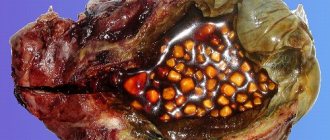“You will be amazed at how easy it is to cure gastritis and ulcers just by taking it every day...
Read more "
Increased stomach acidity in women very often occurs during pregnancy. This is explained by the fact that during gestation the female body experiences enormous stress, and with the gradual growth of the fetus, the organs in the abdominal cavity are displaced. In this case, you need to think about changing your diet or see a doctor for treatment.
Causes of high acidity during pregnancy
Many people believe that any pregnancy must necessarily be accompanied by a burning sensation from the release of gastric juice. However, this is far from true, because the reasons for its appearance are different, and some may have them, while others may not.
The most common causes of high acidity are:
- Hormonal imbalances. If the body produces too much progesterone during the process of bearing a baby, then this gradually relaxes the muscles of the uterus and the esophageal sphincter, which also affects the digestive organs.
- The appearance of pressure inside the abdominal cavity.
- As the baby grows, the organs shift and look for a place that has not yet been occupied by the fetus or other organs. Therefore, the volume of the stomach, being in a compressed state, begins to throw excess juice into the esophagus, which causes a burning sensation. And it seems that the acidity is increased.
- Passive lifestyle. If you move a little, eat at night, and mostly fatty foods, then the body will react to this with poor digestion and the appearance of increased acidity. It is a natural reaction, because the organ tries to digest food faster, increasing the production of juice for this.
You should not self-medicate or try to take pills like no-shpa. It is better to seek advice from a specialist and strictly follow the instructions and recommendations. Depending on the identified cause, the course of treatment will be determined.
Why is gastritis dangerous during pregnancy?
Gastritis and pregnancy are compatible concepts, but if the disease develops suddenly in an acute form, it is necessary to take active measures for a speedy recovery.
Some expectant mothers take their health too lightly. They do not pay attention to the symptoms that appear and expect the pain to go away on its own. When this does not happen, and the unpleasant sensations only intensify, an understanding of the problem comes and panic begins.
You should know the dangers of gastritis during pregnancy in order to, if possible, prevent the development of the problem or minimize the risks if the disease is already developing in the body.
The disease can cause the following harm:
- When severe pain occurs, a woman takes a lot of painkillers, which harms the fetus,
- Inflammatory processes in the stomach can spread to the reproductive organs, negatively affecting the development of the embryo,
- If a bacterial infection occurs, treatment with antibiotics cannot be avoided, which is undesirable during pregnancy,
- Due to severe pain after eating and inflammatory processes, food and the nutrients it contains are not absorbed, and the child does not receive the necessary nutrition.
When a pregnant woman has a stomach ache, this is a reason to urgently consult a doctor. You should not wait for the next scheduled appointment to describe the problem; go to a specialist without an appointment, they must see you.
First, you should visit a gynecologist with whom the pregnant woman is registered. He will get acquainted with the patient’s condition and refer her to specialized specialists. Further treatment will be carried out by a gastroenterologist. Often such patients are offered therapy in a hospital setting.
You should not refuse such opportunities, because you will be constantly under the supervision of medical personnel; experts will be able to take urgent measures in case of a sudden exacerbation or attack of pain, without harming the baby.

General recommendations during the diet
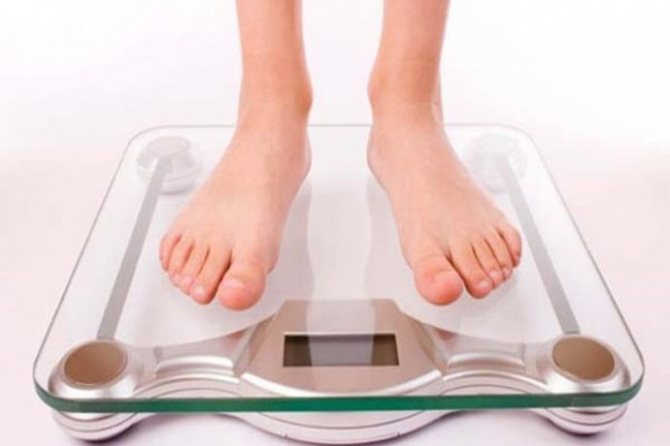
The diet helps to minimize acidity, especially in the early stages and normalize the well-being of the expectant mother. However, besides this, there are a number of recommendations that a pregnant woman must also follow to achieve a lasting effect:
- Do not wear tight clothing, especially with a belt under the chest . Although it is so popular among women expecting a baby, it is precisely these things that can cause frequent heartburn. Therefore, it is better to abandon it for a while.
- Do not drink water before or during meals . Excess fluid increases the amount of gastric juice and leads to a burning sensation. After the meal, at least 20 minutes should pass, after which the liquid can be drunk.
- The number of snacks per day should be increased, while the serving size should be reduced . This will allow the body to gradually digest food, receive all the nutrients, and not overload the stomach at the same time.
- Control weight gain. During the entire pregnancy, it is desirable that it does not increase by more than 14-15 kilograms.
- Try not to eat before going to bed. Dinner should be no later than 3-4 hours before bedtime.
- The pillow should not be too low during the night. If possible, you need to raise the head of the bed a little.
- Do not take vitamins or prescribed active supplements on an empty stomach..
Massage also helps with solving the problem. Stimulation of active points relieves discomfort in the esophagus. You can use a specially designed Seabands program, or massage the area between the wrist and elbow on the inside. Experiencing a blood vessel in this area can abruptly stop the acute feeling of nausea.
How to reduce acid content?
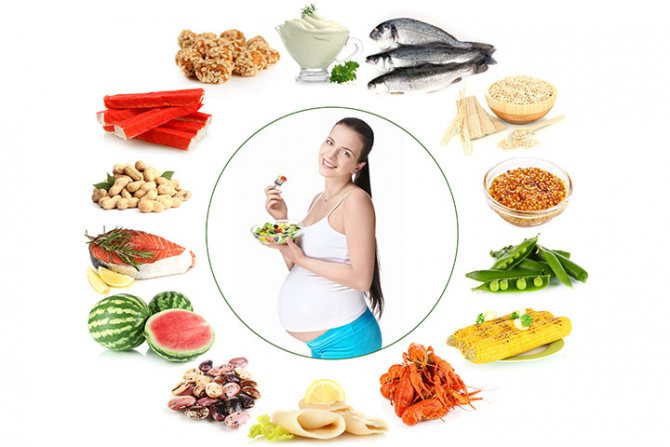
Only a doctor can determine how to reduce stomach acidity. You cannot try to eliminate the pathology on your own, otherwise you can aggravate the situation or harm the child. The only thing a pregnant woman can do on her own is to reconsider her diet. If there are no positive results, the doctor prescribes medications or alternative methods, taking into account the patient’s absence of allergic reactions or contraindications.
Medications
Reducing the acid balance through medications is a traditional technique. Pharmacology provides a wide range of products that are approved even when carrying a child. In the absence of individual contraindications, the doctor may prescribe tablets or suspensions, including Maalox, Almagel, Gastal. You can also reduce the content of acidic substances in the stomach with drugs that relax the sphincter and relieve spasms.
If a pregnant woman has treated toxicosis with Papaverine, it is recommended that she discontinue it.
Traditional methods
Often the reasons for an increase in the acid balance of the stomach are emotional stress: through constant stimulation of the nervous system, disruptions in the functioning of the gastrointestinal tract occur. You can eliminate this cause and relieve the manifestations of the pathology yourself if you take the following medications at home:

Peppermint tea helps normalize the secretory function of the digestive organ.
- Mint or chamomile tea, with the addition of ginger juice and honey. This remedy improves the digestion of food and normalizes the secretory properties of the stomach.
- A decoction of flaxseeds. Normalizes the functioning of the stomach.
- Dill tincture. Reduces the level of acidic substances.
If discomfort occurs, you can prepare the following medicine:
- Crush the egg shell.
- Add a few drops of vitamin D to the pulp.
- If there is a sour taste, eat 1-2 spoons with water.
Proper nutrition
A balanced diet significantly reduces acidity. You need to avoid fatty, fried foods, carbonated drinks and citrus fruits. A pregnant woman with this disorder is recommended to increase her intake of the following foods:
- low fat dairy products;
- still mineral water;
- porridge cooked in milk;
- honey in small quantities.
How to get rid of heartburn?

What to do if you suffer from heartburn all day, which is always a consequence of increased acidity. It is not recommended to buy questionable or untested drugs during pregnancy, because they can become a serious threat to the child. Better try to eat something. There are a number of products that help alleviate the condition during heartburn and quickly stop its manifestation.
- Walnuts.
- Roasted seeds.
- Hazelnut.
- Almond.
- Grapefruit juice.
- Carrot juice.
Peppermint tea also helps a lot; it can not only reduce the appearance of heartburn, but also eliminate the feeling of nausea. All these foods should be eaten in moderation so that they do not cause extra pounds, as they are very high in calories.
Diagnostic measures
Diagnosis of gastritis is a set of measures aimed at identifying the disease, making an accurate diagnosis and subsequently determining a treatment regimen. During pregnancy, some types of diagnostics are not available because there is a risk of fetal death. It is undesirable to perform gastroscopy, because this process provokes severe stress in the woman, hypertonicity of the uterus occurs, and numerous complications are possible.
During pregnancy, a pregnant woman's blood flow changes. All arteries and veins become thin and vulnerable. When performing gastroscopy, there is a risk of injury and subsequent internal bleeding, although only this examination method allows you to visualize the inner surface of the stomach, determine the localization of the inflammatory process and collect contents for biochemical tests.
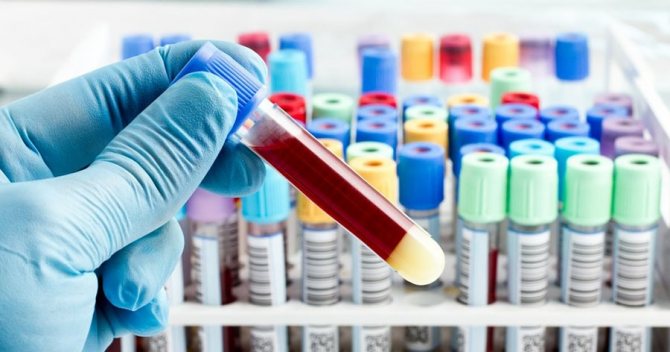
Ultrasound of the stomach is rarely performed, because it is problematic to see the inflammatory process in this way, but during pregnancy this method remains one of the few safe ones to determine gastritis.
Often, routine blood and stool tests help identify the disease and its type. A set of diagnostic measures is prescribed by the doctor in accordance with the patient’s condition, the duration of pregnancy and the characteristics of its development.
Treatment of acidity

They mainly fight high acidity by exclusively changing their lifestyle and diet. However, the doctor may prescribe medications to relieve unpleasant symptoms. The remedy is selected depending on the condition of the pregnant woman and the period. The safest are:
- Rennie.
- Gaviscon.
- Ranitidine.
- Alginic acid.
- Omeprazole.
Among the folk remedies, ginger and chamomile tea, mint, and ground eggshells help a lot. But with herbs, as with medicines, you should be careful not to exceed the recommended dosage and constantly monitored by a specialist. You should not start the situation, hoping that the unpleasant symptom will go away on its own, or that this condition is natural and you just need to endure it. By contacting a specialist and undergoing a simple examination, you can solve the problem and enjoy pregnancy without unpleasant and uncomfortable sensations.
What to do if you have high acidity
Pregnancy sharply narrows medical options: most conventional means of reducing acidity are in this case “out of the game.” It is impossible to radically change the situation, and the doctor can only relieve the most painful symptoms in the form of heartburn and nausea and, if necessary, prescribe safe sedatives.
Medication methods to reduce acidity
Serious drug therapy is preceded by an examination period. Its content is determined based on the results of the examination and, above all, on specific indicators of acidity and the condition of the mucous membranes of the esophagus, stomach, and, if necessary, the duodenum.
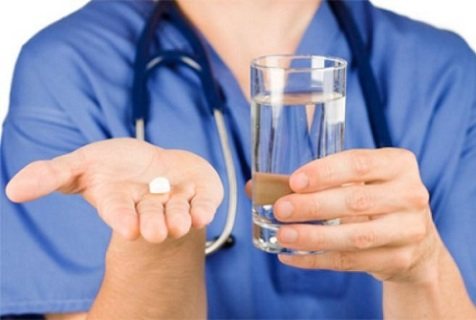
The doctor determines the consequences of increased acidity and its causes. In most cases in pregnant women, it is situational, caused by hormonal changes. In this case, dietary recommendations and the prescription of drugs to protect the mucous membranes are relevant. These are safe drugs for expectant mothers: Maalox, Gastal and Phosphalugel.
Nutrition correction
Increased acidity requires diet. The foods and dishes consumed are selected in such a way as not to irritate the gastric mucosa and not provoke the release of an excess portion of hydrochloric acid.
The basis of the diet should be the following dishes:
- viscous first courses with well-cooked cereals and soft vegetables, so-called slimy soups, puree soups;
- porridge - they are very healthy, as they contain a lot of microelements, they should be boiled, adding milk or cream, and then pureed;
- milk-egg mixtures as part of vegetable or fish broths, which have a good enveloping (protective) effect;
- lean meats, steamed fish soufflés, omelettes and soft-boiled eggs.
The temperature of food is extremely important, since both cold and hot foods activate special receptors responsible for the release of acid.
Important! It should be remembered that fried foods increase the secretion of gastric juice, while boiled foods reduce it.
Folk remedies
Any non-traditional remedy or herbal mixture may contain toxic inclusions or substances with individual intolerance. You should not experiment during pregnancy.
Milk proteins are the only safe type of protein food that can reduce acidity and have an antacid (“anti-acid”) effect. Unfortunately, fermented milk products do not have this ability and require denaturation by gastric juice. A safe way to reduce acidity is to take freshly squeezed vegetable juices - carrot, potato, pumpkin.

Baking soda is only suitable as an emergency aid and only in extreme cases. Its regular use can lead to atrophic gastritis, which will then have to be treated for many years.
Note! Increased acidity is a contraindication for consuming rose hips. Natural honey, being an excellent anti-inflammatory agent and biologically active product, can cause heartburn in some people.
Preventive measures
Gastritis during pregnancy most often occurs in a chronic form with alternating remissions and relapses. Preventive recommendations will help to significantly increase the duration of remission periods, alleviate the condition and reduce the intensity of exacerbation during the next relapse.
The following recommendations will help prevent frequent and dangerous complications, as well as improve the mother’s general condition:
- regimen and dietary nutrition with the use of prescribed foods in the prescribed manner;
- controlling the amount of food eaten;
- refusal of strong tea, coffee, carbonated drinks;
- correct selection of mineral water of the required composition;
- timely treatment of infectious diseases to prevent infection of the stomach walls;
- timely contact a specialist and relief of the inflammatory process as soon as possible.
Careful adherence to the diet, food consumption regimen and all specialist recommendations will help alleviate the condition of the expectant mother and prevent dangerous consequences.
Toxicosis or gastritis?
It is very important to distinguish between the symptoms of exacerbation of gastritis and early toxicosis of pregnant women. Let's compare identical features and establish differences between them.
- Change in appetite . Often present in pregnant women and almost never occurs during exacerbation of the disease, with the exception of atrophic conditions. While waiting for the baby, appetite increases, and with exacerbation of gastritis, it decreases.
- Changes in taste and smell. These symptoms are characteristic of the beginning of pregnancy; they are not present during exacerbation of gastritis.
- Nausea . During pregnancy, it occurs in the morning and is also caused by staying in a stuffy room. Nausea in women can be caused by strong smells and aromas. With gastritis, nausea is less pronounced, but during an exacerbation it is almost constantly present, intensifying after eating.
- Vomit. During pregnancy it is periodic and occurs in the morning. In case of acute inflammation of the stomach, it can be repeated and debilitating.
- Weakness, irritability . Inherent in both conditions, with gastritis they are less pronounced than with pregnancy. Expectant mothers are prone to rapid mood swings, tearfulness, and insomnia.
- Dizziness . It almost never occurs with gastritis, with the exception of acute conditions associated with diarrhea, vomiting and dehydration.
For gastritis, the listed symptoms are characteristic during the period of exacerbation, for pregnancy - not always, they do not occur in all women and are subjective. More striking signs are the absence of menstruation, an increase in the subcutaneous fat layer, and pigment spots on the skin.
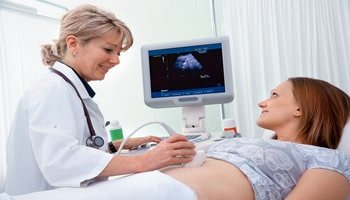
There are no difficulties in diagnosing pregnancy in our time; it can be done independently using an express test.
The notorious two stripes confirm the presence of gonadotropic hormone in the urine, and it is present only in pregnant women. However, home testing should not be taken as a basis; an accurate diagnosis is established after visiting a gynecologist and performing an ultrasound diagnosis.
How is the diagnosis carried out?
works exclusively on the latest technological equipment. This makes it possible to diagnose the internal organs of the digestive system efficiently, effectively, quickly and painlessly for patients.
To make a diagnosis, the following types of studies are used: ultrasound, endoscopic methods, X-rays, computed tomography (CT), magnetic resonance imaging (MRI), laboratory diagnostics.
Instrumental research methods include:
- Gastroscopy or esophagogastroduodenoscopy (EGDS) is an examination of the gastrointestinal tract with an endoscope - a thin flexible instrument with a fiber optic thread and a video camera lens at the end. The study is carried out before surgery, as well as in cases of complaints of stomach pain, nausea, vomiting, and flatulence. The procedure lasts 10-15 minutes.
Contraindications to gastroscopy are: disruption of the patient’s cardiovascular system, stroke, mental illness, and pathologies of the upper respiratory tract.
Before the study, you must stop eating 10 hours before, stop smoking and, in consultation with your doctor, take medications. The EGD procedure is not painful. Patients are given anesthetics during the preparation stage. The result of the study and its transcript are issued on the day of the study. According to indications, gastroscopy is prescribed together with fibrocolonoscopy.
- Digital fluoroscopy is a visual diagnosis of the gastrointestinal tract. Indications for the study: pathological weight loss, blood and mucus in the stool, abdominal pain, vomiting, heartburn. It is necessary to distinguish between fluoroscopy and radiography. The last option is to obtain x-rays.
Contraindications to the procedure: intestinal obstruction, violation of the integrity of the stomach walls, pregnancy, allergic reaction to barium preparations.
Before the study, you should not eat legumes, baked goods, or dairy products. After diagnosis, it is possible that nausea and discoloration of stool may occur, which is due to the intake of a contrast agent - barium.
- Ultrasound or echography is a study in which ultrasonic waves with a frequency of 20 kHz are reflected from organ tissue. It is believed that ultrasound is not as informative for diseases of the esophagus and stomach compared to gastroscopy. This type of diagnosis is prescribed to children, as it is less painful.
Preparation for the procedure is carried out 3 days before the ultrasound scan. At this time, it is necessary to exclude baked goods, carbonated water, legumes, and milk from the diet. You should not eat or drink before the diagnosis. The result is given to the patient a few minutes after the procedure.
A gastroenterologist's patient may be referred for additional examinations:
- Gastropanel – donation of venous blood to determine the risk of developing gastric diseases.
- Blood test for enzymes: transaminases, gamma-GT, amylase, lipase, bilirubin.
- Assessment of gastric acid secretion.
Causes
There are 2 types of this disease: “A” and “B”.
In the first case, it is caused by the progression of the atrophic process in the walls of the digestive organ. Organ cells are affected.
The second type begins to develop due to the ingress of pathogenic microorganisms. One of them is Helicobacter pylori. A woman can become infected both before and after conception.
With hormonal changes and weakened immunity, gastritis worsens during pregnancy. To find out the type, you need to visit a gastroenterologist. It is not recommended to diagnose yourself.
Reasons for exacerbation:
- improper and unbalanced diet;
- overeating, dry food;
- iron deficiency;
- stress, depression, increased anxiety;
- chronic infectious diseases;
- genetic predisposition.
Based on the above, we can come to the following conclusion: the cause is poor nutrition.
Treat or wait?
Many ladies are sure that treatment of the disease during pregnancy cannot be carried out, and that one should not limit oneself in nutrition, since the unborn child needs a large amount of nutrients. They are partly right - it is really undesirable to carry out drug therapy, especially in the first and second trimester, when the fetus is still developing.
Important! If Helicobacter is detected, eradication therapy is prescribed after childbirth and the end of the breastfeeding period.
In terms of diet, the limits for pregnant women do not expand. On the contrary, even more attention should be paid to diet to prevent exacerbations. Proper nutrition while expecting a baby is the main treatment tool for gastritis.

With regular violations of the regime and dietary errors, the chronic process can worsen and even become more complicated, turning into an erosive form or peptic ulcer.
In addition, digestive dysfunction will develop - nutrients will not be fully absorbed, which will affect the child’s condition.
The use of any medications must be agreed with a doctor. Only a doctor is able to take into account all the side effects of drugs and correlate the harm and benefits of their administration to a woman carrying a child. Antacids, enzyme preparations, eubiotics are sometimes recommended in short courses, antibiotics are completely excluded. Herbal teas and mineral waters are not contraindicated, but again, only on the recommendation of a doctor. The diet during an exacerbation must be followed pedantically, the transition to a normal diet is carried out gradually.
